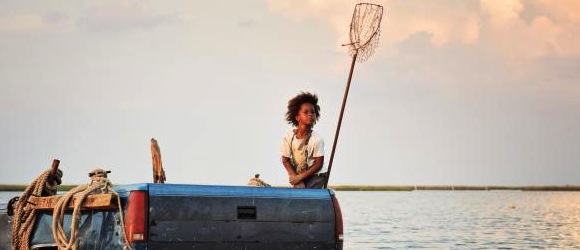Last Tuesday, I saw Beasts of the Southern Wild in the afternoon and Brave in the evening. This resulted in A) me consuming far more popcorn than one probably should in a 24-hour period (but I don’t care, because it’s movie theater popcorn and I can’t be tamed) and B) me getting completely spoiled when it comes to seeing movies with well-rounded female protagonists.
Seriously. My tolerance for arm-candy love interests assigned token tasks over the course of a movie so they can help the main character and have something to do while they look pretty *coughTheAmazingSpider-Mancough* is now below zero, because these movies have given me two perfect examples of how it should be done.
Seeing as this isn’t a review of Brave, I won’t go on about how awesome a role model—or how awesome a character in general—Brave’s Princess Merida is. But seeing Brave and Beasts so close together really made me think about where Hushpuppy, the protagonist of the latter film, fits in with her fellow female protagonists.
First, let me just clarify: As I see it, Beasts isn’t really concerned with analyzing gender roles, at least not explicitly. That’s not what it’s about. In it, Hushpuppy and her father Wink live in Bathtub, a storm-threatened Delta community located on the more water-logged side of some heavy-duty levies built to keep the mainlands dry. When a hurricane decimates Bathtub and releases the prehistoric super-buffalo known as aurochs, Hushpuppy sets out to find her mother, who left Bathtub shortly after she was born.
One of the main themes of the film is how mankind interacts with the world at large, and Bathtub represents that on a smaller scale. Everyone, from old-timers to kids like Hushpuppy, has their role to play in keeping the community afloat (literally—after the storm, those survivors who refused to leave for drier pastures set up shop on a fishing boat). No one works harder than anyone else, and every person depends on each of the others with their lives. Pre-storm Bathtub, though bereft of things like phones, computers, and (unless I’m forgetting something) indoor plumbing, is like a uniquely Southern vision of Utopia. (Completely unrealistic, but this is a fantasy movie.)
Hushpuppy, the youngest of the group of survivors, is a force of nature. There’s no mother trying to force her to get married or hapless suitors trying to win her as a prize (she is only six, after all). Rather, the whole world, from well-meaning rescue workers to nature itself, seems intent upon bringing to an end the only home she’s ever known. And Hushpuppy will have none of it. When her father isn’t there one day to cook the chicken that they and Hushpuppy’s menagerie of animals eat, she lights up the stove, gets out a can of dog food and whips up a meal herself. When–trying to stay spoiler-free here—her father makes a very important decision and explains how he knows it hurts her, but it’s for her own good, she tells him no—she may be a little girl, but no one’s going to decide what’s best for her but her. When she decides to find her mother, she and her ragtag group of hurricane orphans wade out into the water and swim out to sea to find her.
There are plenty of Hollywood heroines out there, some who take their fate into their own hands and don’t allow themselves be defined by the expectations of others, some who… well, see the aforementioned arm-candy comment. Hushpuppy, a six-year-old with no superpowers, no great destiny, not even much by way of contact with the outside world, is a more active female protagonist than 99% of them. (Side note: Gotta love indie movies!) She doesn’t take any shit from anybody, and she gets stuff done. When she messes something up, she fixes it. When someone else—or something else, as in the case of the aurochs, who are drawn to sadness and distress, which Hushpuppy has in spades—tries to impose their will upon her, she will not have it. She’s a role model for men and women, girls and boys (not that I’d imagine too many people Hushpuppy’s age will see this, but still). Beasts of the Southern Wild may not be a comic book movie, but you can be damn sure that Hushpuppy is a superhero.
I can’t wrap this up without mentioning the young actress Quvenzhané Wallis, who plays Hushpuppy. It’s like when talent was being handed out, God (or whomever) took the total amount designated for the whole of the Disney Channel, multiplied it by 12 or so, and gave it to Wallis. In a movie that’s set in a fantasy world not too different from our own, any false note could have messed up the delicate balance of real-vs-not-real director Benh Zeitlin had going. Without finding a natural for the main role, this movie simply would not have worked. Luckily for everyone (including myself—even hot, trash-strewn New York City seemed magical and fantastical after I got out of the 12:05 showing), he found Wallis.
Currently, Beasts of the Southern Wild is playing in limited release, with screenings in a handful of major cities across the country. It’ll be expanding to more cities in the coming weeks, though (winning major awards at Cannes and Sundance will do that for a film), and if you can, I heartily recommend checking it out. Combine it with Brave, and you have a more positive portrayal of kick-ass females than you’re likely to find in all the rest of this summer’s movies combined.
Rebecca Pahle writes for MovieMaker.com.
Are you following The Mary Sue on Twitter, Facebook, Tumblr, Pinterest, & Google +?








Published: Jul 10, 2012 12:31 pm